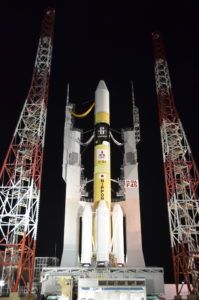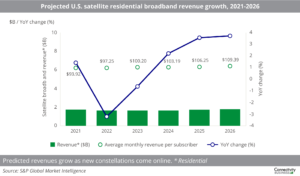The list of the top stories for Q2 2022 in descending order shows that Connectivity Business News readers focused on constellations, investments and developments in specific, fast-changing verticals. The articles cover issues of concern during the past three months: supply chains, cybersecurity, the internet of things (IoT) – and new business opportunities in low Earth orbit (LEO) as well as other areas of the space connectivity industry.
1. Data providers overcome connectivity gaps to keep supply chains running

Executives from companies that provide and use data that track the supply chain discussed how freight is tracked throughout the supply chain, often using satellite connectivity.
2. Rivada issues RFPs for constellation designed for disruptive pricing
The Germany-based company is currently seeking requests for proposals (RFPs) after completing requests for information (RFIs) and has not yet decided whether to work with one partner or several, Chairman and CEO Declan Ganley told Connectivity Business News.
3. Starlink looks to disrupt aviation market with Delta IFC tests
Atlanta-based Delta Air Lines (NYSE: DAL) has tested satellite broadband provider Starlink’s technology to deliver Wi-Fi connectivity on its passenger airplanes, which could disrupt the in-flight connectivity (IFC) market.
“Starlink’s entry into the commercial aviation segment will undoubtedly disrupt the IFC competitive environment. The question is: to what extent?,” Daniel Welch, co-founder and senior consultant at aviation specialist Valour Consultancy told Connectivity Business News.
The overall aeronautical satcom market, which includes IFC, will deliver more than $48 billion in cumulative revenue through 2031, according to a recent Northern Sky Research report.
4. Inmarsat launches IoT partner ecosystem, beam rentals
Elevate enables companies to access and collaborate with a range of IoT partners, Mike Carter, president of Inmarsat’s enterprise division, told Connectivity Business News.
The news builds on Inmarsat’s announcement last month that it is making satellite services available on a rental basis. “Normally, the leasing customer will see an agreement that covers a static area through a static beam, which gives us a finite number of beams that they can operate the services within,” Carter said.
5. DoD’s IT agency to award contract to Viasat
The Defense Information Systems Agency (DISA) will award a contract worth up to $50 million to Viasat (NASDAQ: VSAT) for airborne satellite communications services on behalf of the U.S. Marine Corps, according to a June 8 pre-solicitation notice.
The sole source contract would be worth somewhere between $10 million and $50 million, according to a list of DISA’s fiscal year 2021 acquisition opportunities.
6. Satellite residential broadband will switch to LEO by 2026
These LEO constellations will deliver new technologies with higher capacity and performance, Ian Olgeirson, analyst and author of an S&P Global Market Intelligence report released earlier this month, told Connectivity Business News.
Even though Starlink announced 250,000 residential and commercial customers as of March, “comparably lower speeds and higher prices are unlikely to displace wireline or even fixed wireless alternatives,” according to the report.
7. Viasat walks the line on transparency after February cyberattack
U.S. satellite communications provider Viasat was faced with a practical question following a massive cyberattack against the Ukrainian government in February: How much information should it share about the attack, and with whom?
“The adversary is continuing to attempt to do things for the network, and their tactics are continuing to change,” Craig Miller, president of government systems at Viasat, said during the CyberLEO conference in Los Angeles. “So I’m not going to be very specific at this time about the events because, basically, I don’t want to give them battle damage assessment.
8. Iridium CEO Desch: The critical role satellite connectivity plays in IoT
The company is keeping its focus on the growing role of internet of things (IoT) technology, which now makes up 75% of Iridium’s subscribers and nearly one-third of its commercial revenues, Chief Executive Matt Desch told Connectivity Business News during a Connectivity Business Summit fireside chat. The discussion, presented as a webinar, touched on financial and strategic issues affecting space connectivity, and technology trends like security.
The Connectivity Business Summit 2022 is a free webinar series addressing key issues in satellite technology and investment. View the agenda here. Register here to attend.












